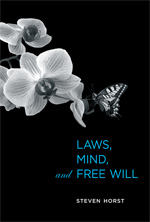Horst’s Book on Laws, Mind and Free Will

Steven Horst, professor of philosophy, is the author of Laws, Mind and Free Will, published by MIT Press in March 2011. This is his third book.
In Laws, Mind, and Free Will, Horst addresses the apparent dissonance between the picture of the natural world that arises from the sciences and our understanding of ourselves as agents who think and act. If the mind and the world are entirely governed by natural laws, there seems to be no room left for free will to operate. Moreover, although the laws of physical science are clear and verifiable, the sciences of the mind seem to yield only rough generalizations rather than universal laws of nature. Horst argues that these two familiar problems in philosophy—the apparent tension between free will and natural law and the absence of “strict” laws in the sciences of the mind—are artifacts of a particular philosophical thesis about the nature of laws: that laws make claims about how objects actually behave. Horst argues against this Empiricist orthodoxy and proposes an alternative account of laws—an account rooted in a cognitivist approach to philosophy of science.
Horst argues that once we abandon the Empiricist misunderstandings of the nature of laws there is no contrast between “strict” laws and generalizations about the mind (“ceteris paribus” laws, laws hedged by the caveat “other things being equal”), and that a commitment to laws is compatible with a commitment to the existence of free will. Horst’s alternative account, which he calls “cognitive Pluralism,” vindicates the truth of psychological laws and resolves the tension between human freedom and the sciences.

